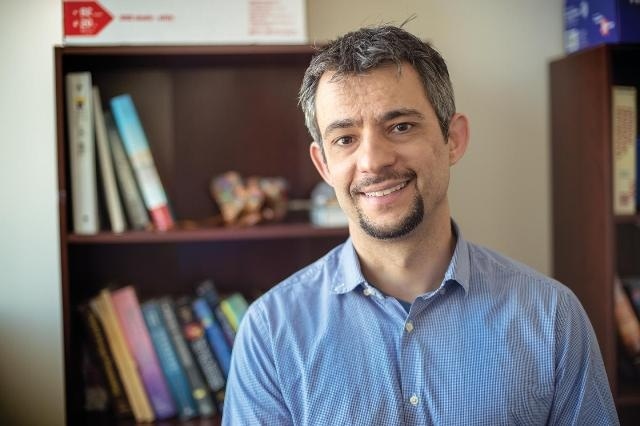Mar 10 2016
A researcher at The University of Texas at Arlington is working to develop a framework for a network of simple sensors that could be as powerful as a supercomputer, but smaller and less costly.
 Ioannis Schizas, an assistant professor in UTA's Electrical Engineering Department, will create a low-cost sensing environment that will create the processing power of a supercomputer as part of a three-year, $150,000 National Science Foundation grant. (credit: UT Arlington)
Ioannis Schizas, an assistant professor in UTA's Electrical Engineering Department, will create a low-cost sensing environment that will create the processing power of a supercomputer as part of a three-year, $150,000 National Science Foundation grant. (credit: UT Arlington)
Ioannis Schizas, an assistant professor in the Electrical Engineering Department, will create a sensing environment that will use many simple devices to process data that currently requires the use of a supercomputer as part of a three-year, $150,000 National Science Foundation grant.
This network of sensors could be applied to surveillance and defense, healthcare applications such as detection of sleeping disorders or structural monitoring for bridges and buildings. Other applications could work with NSF's National Ecological Observatory Network program, which calls for sorting large amounts of climatic data to try to identify patterns in weather, the researcher said.
"Sensors provide huge amounts of data, but using and applying the data they collect requires a very powerful computer. I hope to eliminate that need through simplicity of design," Schizas said. "When there are many sensors, there is scalability and a robust system with no single point of failure. This is attractive because costs are fixed, and there is a built-in backup for every part of the system."
Schizas' research supports UTA's work to advance Health and the Human Condition, Sustainable Urban Communities, Global Environmental Impact, and Data-Driven Discovery under the Strategic Plan 2020: Bold Solutions | Global Impact, said Khosrow Behbehani, dean of the College of Engineering.
"When humans are able to collect data from sensors remotely, it reduces expense and potential injuries or casualties. It also increases efficiency because problems can be detected early," Behbehani said. "Dr. Schizas' innovative thinking will make this easier by making it possible to use devices that can be found in a local store. This has great potential to change the way sensors are used."
To create his sensing environment, Schizas will use multiple off-the-shelf sensors to gather different types of data and find a way to unify them so that they will sort the data he wants and ignore the rest.
Schizas will prompt the devices to collaborate with each other and eliminate the need for supercomputing by using optimization techniques to determine the best placement of sensors, including thermometers, pressure sensors, accelerometers and acoustic sensors, equipped with digital signal processors and wireless communications units.
Schizas joined the UTA Department of Electrical Engineering in 2011. His general research interests lie in the areas of statistical signal processing, wireless sensor networks and data compression.
Currently, he is working on the design and analysis of distributed information processing methods with emphasis on the handling and information mining of large amounts of data with applications to multi-threat tracking, sleep disorder assessment and distributed data bases.